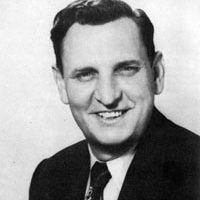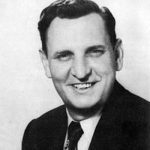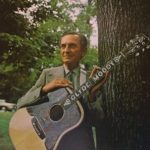
Clyde Moody
Clyde Moody was a bluegrass and country musician most well-known for his stint with Bill Monroe and the Blue Grass Boys in the 1940s, and his biggest-selling composition, “Shenandoah Waltz.” Due in large part to the success of “Shenandoah Waltz,” Moody became known as the “Hillbilly Waltz King” and is considered one of the founders of the bluegrass sound for his role in Monroe’s band during a pivotal development stage.
Moody was born and raised in Cherokee, North Carolina, where he grew up hearing a lot of local string band music. In the 1930s, Moody and Jay Hugh, sibling of Roy Hall, formed the Happy-Go-Lucky Boys and started playing on the radio in Spartanburg, South Carolina. Later, they joined Mitchell County fiddler, Steve Ledford, and Buncombe County’s Wade Mainer to form The Sons of the Mountaineers. The band also performed on regional radio stations and made recordings for Bluebird Records.
In 1940, Moody joined Bill Monroe and The Blue Grass Boys, performing with them on WSM’s Grand Ole Opry. Monroe had not yet hired Lester Flatt and Earl Scruggs, who would help solidify the bluegrass sound, and Moody was part of the band configurations that led up to that development. Moody sang and played guitar with Monroe, and he is also the only Blue Grass Boy member to record on mandolin, while Monroe played guitar on “Mule Skinner Blues” and “Dog House Blues.” Moody played with Monroe for the better part of five years, aside from a run with Lester Flatt, performing duets on radio in Burlington, North Carolina.
Moody left Monroe’s band in 1945, remaining on the Grand Ole Opry as a solo artist. He also started making recordings for Columbia, including his most famous “Shenandoah Waltz in 1947. Other hits of this period included “Cherokee Waltz” and “I Waltz Alone,” helping contribute to his nickname. Moody moved to Washington D.C. in the late 1940s to perform with Connie B. Gay. In the early 1950s, he signed with Decca and recorded some solo singles and as a member of Browns Ferry Four with the Delmore Brothers on King Records.
After leaving music for a few years in the late 1950s to work as a home salesmen, Moody returned to music n the early 1960s recording a solo album, followed by a more modern country album. When the folk revival revved up in the mid 1960s, Moody played at festivals and became more active in the bluegrass scene. In 1972, he returned to Nashville, playing bluegrass and country music, which he continued through his remaining years.
Moody performed at the White House several times over his career, and he was inducted into the North Carolina Music Hall of Fame in 2011.




